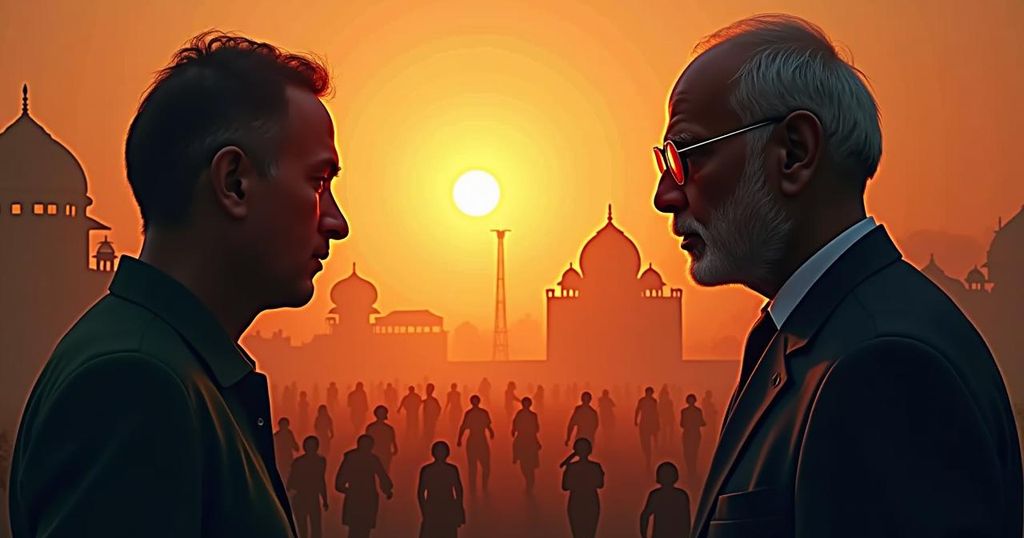Amid escalating tensions following the ouster of Prime Minister Sheikh Hasina, Bangladesh has recalled its High Commissioner to India, Mostafizur Rahman. This decision comes after pivotal talks between Indian diplomats and the new Bangladeshi leadership under caretaker Muhammad Yunus, marking a significant shift in foreign policy. The recalls of top diplomats from multiple nations reflect a broader reorganization of Bangladesh’s diplomatic approaches as the new government navigates its international stance.
The Interim Government of Bangladesh has taken a notable step by recalling Mostafizur Rahman, the High Commissioner to India, amid escalating tensions between Dhaka and New Delhi. This decision follows a day after Indian High Commissioner Pranay Verma engaged in discussions with Md. Touhid Hossain, the Foreign Affairs Adviser to the Bangladeshi government, focusing on the enhancement of bilateral relations. This recall signifies a pivotal moment in the diplomatic dynamics of the two nations, which have become increasingly strained following significant political upheaval in Bangladesh earlier this year. This diplomatic reorganization extends beyond India. The Bangladeshi government has also summoned its top diplomats from Australia, Belgium, Portugal, the United Kingdom, and the United Nations, highlighting a comprehensive restructuring of its diplomatic representation. Notable figures among those recalled include Muhammad Abdul Muhith, the Permanent Representative to the United Nations, and M Allama Siddiqui, the High Commissioner to Australia. The recent political turmoil in Bangladesh, stemming from the removal of long-standing Prime Minister Sheikh Hasina, has profoundly altered both domestic and international policies. Hasina, who was forced to flee the nation in August due to a student-led uprising, resigned shortly before her departure to India. In her stead, Nobel laureate Muhammad Yunus has assumed the role of caretaker leader, indicating a significant transformation in governance for the South Asian country. Following the Hasina administration’s exit, the relationship between Dhaka and New Delhi has cooled considerably. Hasina was recognized for cultivating strong ties with India across various sectors, including trade, defense, and infrastructure development. Her administration actively collaborated with Indian authorities on initiatives designed to improve connectivity and maintain regional stability. However, her unexpected exit has destabilized this partnership. Historically, India has enjoyed amicable relations with the governments of Bangladesh; however, the caretaker government under Yunus seems poised to redefine its foreign policy approach. This recalibration is exemplified by the recent recalls of key diplomats, which raises pertinent questions regarding the future alignment of Bangladesh’s international relations. Tensions have escalated, particularly in light of Hasina’s swift flight to India after her resignation, perceived by some in Dhaka as an indication of India’s endorsement of her government. This perception has fueled anti-India sentiments among certain factions within the Bangladeshi populace. The new leadership under Yunus appears to be adopting a more cautious diplomatic stance, suggesting an impending shift in the bilateral relationship. Mostafizur Rahman, who served as Bangladesh’s high commissioner to India since July 2022, was instrumental in fortifying the bonds between the two countries during his tenure. His focus was primarily on development collaboration and enhancing trade and economic ties. With a background that includes serving as Bangladesh’s Permanent Representative to the United Nations in Geneva and ambassador to Switzerland and Singapore, Rahman is a seasoned diplomat. He is a graduate of Sir Salimullah Medical College in Dhaka and holds a Master’s degree in Public International Law from the University of London, along with a Post-Graduate Diploma from the International Institute of Public Administration in France. His recall signifies the current administration’s intention to pursue a revised foreign policy in the wake of recent political shifts. India and Bangladesh have a rich history characterized by cultural, economic, and political connections; however, the present uncertainties pose significant challenges. Under Hasina’s administration, efforts to enhance trade relations and manage contentious cross-border issues, including terrorism and illegal immigration, fostered a relatively stable relationship. The future of these policies under Yunus’s leadership remains uncertain, as both countries navigate these delicate dynamics.
In the context of increasing political instability within Bangladesh, particularly following the upheaval that led to the resignation and subsequent flight of Prime Minister Sheikh Hasina, the diplomatic landscape between Bangladesh and India has undergone critical changes. This turbulence has prompted not only the recall of Bangladesh’s high commissioner to India but also the withdrawal of top diplomats from other key countries, reflecting the government’s desire to reassess its foreign policy direction following a significant shift in leadership to a caretaker government under Muhammad Yunus.
The recent recall of the Bangladeshi High Commissioner to India signifies a considerable shift in diplomatic relations between Bangladesh and India, exacerbated by political upheaval in Bangladesh. Mostafizur Rahman’s recall, alongside a broader diplomatic restructuring, indicates the new government under Muhammad Yunus is adopting a more cautious approach towards international relations. This recalibration could reshape the historically cooperative ties between the two nations, leaving much uncertainty in the wake of Sheikh Hasina’s administration and its strong alignment with India.
Original Source: www.financialexpress.com







